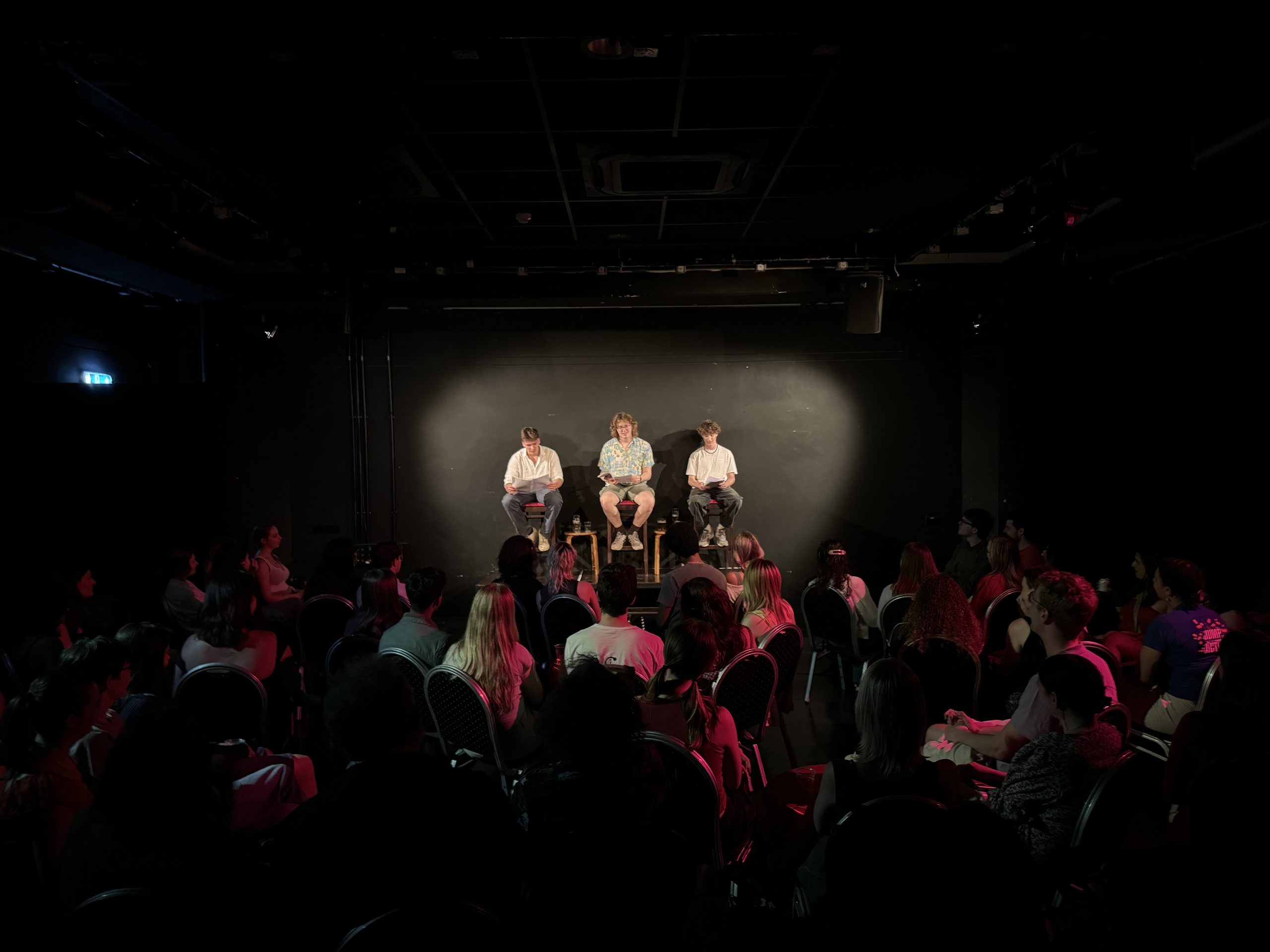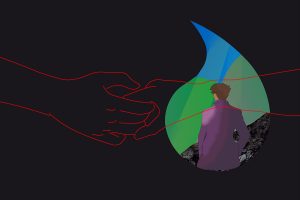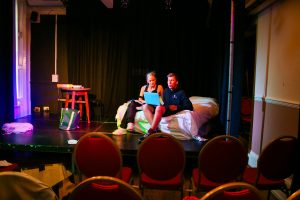Watching ‘Manwatching’
by Violet Aitchison | May 17, 2024

“This is so funny; I’ve never been interviewed before.’’
“Really? It’s your lucky day. How do I start though? I normally come more prepared but because it’s you, I’m like, it’s fine.’’
I’ve conducted a couple interviews during my time at university, but this one felt special not just because of how brilliant Manwatching turned out, but because that brilliance came from one of my good friends – Orli Wilkins. I’ve known Orli for just over a year now, and in this time, I’ve seen several productions that she’s had a hand in. Normally, Orli takes on the role of ‘lighting designer/operator’ but Manwatching marks her first role as ‘creative director’ (a title she at first refused to accept, calling it “poncy”, but I insisted she designate herself).
Performed at the Micheal Pilch Studio for four sold–out nights from 8th May – 11th May, unlike any other production, Manwatching didn’t need nor benefit from reviews during its run. Central to its intrigue was the ambiguity around the whole performance. First performed at Edinburgh Fringe in 2015, Manwatching is a monologue about female sexuality–including topics such as masturbation, details of sexual fantasies, and abortion–written by an anonymous female playwright, and performed by a man who has never seen the script. The anonymous playwright explains, “I thought, who better to give the words of a woman desiring men to than the voice of a man, as it’s so much more comfortable and familiar for us to hear about desire though the male perspective?’’ From the beginning, the playwright made clear that the piece’s intention was to demonstrate how little women’s voices are listened to or respected. How, even when speaking about a woman’s sex life, people would be more likely to listen to a man, even if he knew nothing about the woman, than they would her. And what better place to stage this than at Oxford: a university notable for its stereotypes around toxic masculinity.
Orli and her co-directors–Sonya Luchanskaya and Alec Tiffou–masterfully crafted four sets of three clueless men from across the university to read out their edited version of the monologue. Whilst Orli says they initially intended to lean into the stereotypical ‘Oxford man’, she explains that “as time went on, the people we ended up picking tended to be more on the side that would’ve understood the concept.’’ We both agreed that the possibility of a humiliated or pissed–off performer would’ve taken away from the message. Across the week of shows, she included performers ranging from boys who had never stepped foot on a stage, to resident drama boys, to rugby ‘blues’ players. On the night I went to watch, Friday 10th, she described the lineup of boys almost like Goldilocks does her porridge: the first “always acts’’, the second ‘’sometimes acts’’, and the third ‘’never’’ does. The mix of characters created dimension to the piece, which is why, unlike the original performance, they decided to have three men read the monologue at once, rather than just one.
It’s easy to assume that Orli could have seen one night as the standout of the four, but she explained, “I don’t have a favorite night, because obviously they were all reading the same thing, but they were all completely different, but all the same at the same time.’’ The beauty of these performances was that there was no right way to perform it, there was no ability to rehearse it, and each person brought their own flare. Orli continued, telling me that it was at first tricky for them to figure out how to naturally build in pauses which would either allow jokes to land or make space for an appreciation of the more serious moments. The lack of direction helped to create a playful, experimentative atmosphere but it also meant that the directors couldn’t necessarily lead the boys into delivering the lines comedically or sincerely and at the right times: after all, they were reacting to the content in real–time.
Eventually, during the editing process, Orli, Sonya, and Alec realized they’d have to structure the pages to almost build in these breaks: “The page turning was tactical… I told them they had to follow along and not read ahead, especially for the lines where you hopefully elicit a reaction in them as well as the audience… we were very manipulative with the way that we structured the script.’’ Clearly, the men held a tremendous task; ostensibly serving as a mouthpiece for the anonymous playwright’s monologue, they also had to manoeuvre the structure set up by Orli, Sonya, and Alec.
Alongside the months of editing, structuring, planning, and marketing (Orli acknowledges Imogen Boxall for this mastery), she also accredits the subtle but significant role played by both the staging and the audience for ensuring the performance’s success. Whilst the staging seemed simple – three stools, and three side tables for their pint glasses, one for each performer – it remained integral to the set-up. From the first moment she had the idea, Orli always imagined the men sitting on the stools, creating a casual ambience reminiscent of a pub-like setting. And the pint served as both liquid courage for the boys and as reinforcement of this ‘laddish’ air to the setting. The stools were raised on platforms so that the audience could see the performers, but Orli maintained that the audience was just as important as the actors. Without the laughs at the jokes, and the silence at the more serious moments, their performance was ineffective. When asked about it, Orli clearly expressed her gratitude at the message’s reception; that the audience responded with the empathy, humour, and sensitivity she had hoped for.
However, she admits that it wasn’t necessarily the reception of the message that she was most proud of: “I feel like the point we were making was obvious but important, but [the best part] was that all the boys who were involved said that they really enjoyed it, and they were really proud of the fact they’d done it. Most of them said they learnt something from doing it.’’ I suppose anyone who creates a piece like this always wants the audience to leave the setting feeling affected or as if they’ve learnt something new. But what made Manwatching so special is that you left the theatre feeling like every person in the room, cast and all, had benefited from the experience. However, this is notably unsurprising in Orli’s case. Throughout our friendship, I’ve always noticed she has a special talent for prioritising the most interesting and thoughtful things. And as we got to the end of our coffees and the most informal ‘interview’ I’ve ever conducted, I was re-reminded of this fact as she acknowledged her gratitude for her co-director and producer, Sonya.
Being friends with Sonya, who runs Oxford’s resident production company, Matchbox, there was a predestined partnership for the two. Orli had first met Sonya last year through the Oxford drama scene. She confesses “she was the person I was most nervous about liking it, because I value her opinion so strongly, and because she trusted me enough to do it. So, once she enjoyed the first night, I was like ‘okay great, we’re fine.’’’ Throughout our chat, Orli consistently returned to the brilliance of her friends and coworkers, Sonya, Alec, and Imogen to whom she touchingly attributed a huge amount of the performance’s success to.
To me, Manwatching was clearly an extension of Orli’s devotion to theatre, friends, and life at Oxford. However, it doesn’t take knowing her personally to see that this production provided a breath of fresh air in an overcrowded drama scene which can easily creep into the territory of featuring the same cast of people and format.
“I could have done ten more nights of it.’’
“Yeah, you could’ve, I wish you did, it was so good.’’
“Yeah, she poses the questions but not the answers. I think that’s really important.’’∎
Words by Violet Aitchison. Image courtesy of Orli Wilkins.




